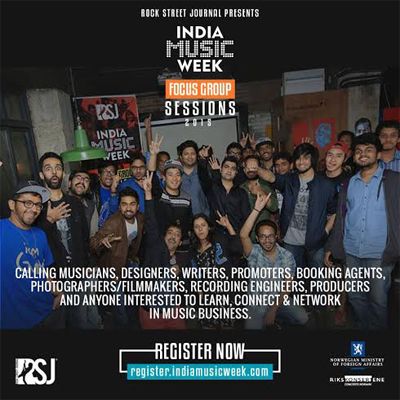
Mumbai: Rock Street Journal kicked off the first of the IMW (India Music week) focus sessions in Mumbai at Todi Mills on 12 December. True to its intentions, the sessions were closely knit with a lot of engagement between the audience and the expert panellists who welcomed questions from the audience. With NH 7 sessions in the schedule, the topics covered included filming, YouTube seeding, festival programming, publishing, digital distribution, artist management and live sound. The sessions on music publishing witnessed the highest participation by the audience.
The sessions started with Kunal Punjabi and Reema Sengupta of CATNIP talking about the latest concept of festival filming and music related video content. A video clip of the Bacardi NH7 Weekender in Shillong was screened. The video very well received by the audience and other panellists. Anirban Chakraborty aka Bann, who was moderating the session, asked pertinent questions of Punjabi and Sengupta about this concept, to which they replied that it was a new, lucrative and self-sustaining venture. The duo also encouraged interested individuals to take up festival filming as a career option.
This was followed by a session moderated by OK Listen founder Vijay Basrur, with Culture Machine operations lead Russell Pinto and Sooperfly marketing head Vishal Nongbet. The panellists spoke about the importance of Youtube and social media, and how important it is for an artist to garner a fan base on these platforms. Examples of a few YouTube success stories were shared by the panel.
The next session spoke about festival programming in India, where NH7 co-founder Arjun S Ravi discussed the challenges faced when OML programmed a huge roster for the Bacardi NH7 Weekender. He stressed on the fact that there were a number permutations and combinations to deal with, in addition to artists’ requests and preferences, while programming the event. Another topic of discussion was the dearth of headliners for an event, where organisers felt that there were not too many quality bands or artists fit enough to headline an event.
Next, Ram Sampath spoke at length about his musical journey, which started from a humble middle class family, to making a successful career in many forms of music. It was a very inspiring session for musicians when he spoke about working for 22 hours a day at a very young age. Sampath highlighted the difficulty of acquiring music gear in those days, and how he struggled against all odds.
The next session, which was most interactive, discussed topics like music publishing, digital selling/distribution with Turnkey Music & Publishing MD, Atul Churamani as one of the panel members. This session was on topics such as how critical it was for an artist to know the various rights involved, the role of record labels, and making money through publishing. It was agreed that there was a lack of structure and understanding of the publishing business in India, but the situation was slowly improving. The panellists also stressed upon the fact that music should not be given free, because free music would eventually lose its value.
Post this session, the next panel spoke about artist management and touched base on the roles and responsibilities of an artist manager. The panel stressed on the fact that an ideal artist manger needed to identify the abilities and potential in an artist and to steer the artist’s career accordingly. It was very important for the manager to assess and evaluate a realistic plan for the artist.
The last session for the day covered sound set up for live gigs, where the panellists spoke about do’s and don’ts of a typical sound check. There was emphasis on how ‘on-stage chemistry’ and ‘understanding’ between the band resulted into creating a good sound , and, that it was not only the sound engineer who could do all the magic.